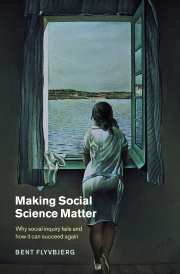3 - Is theory possible in social science?
from Part one - Why social science has failed as science
Published online by Cambridge University Press: 05 June 2012
Summary
If I was told anything that was a theory, I would say, No, no! That does not interest me.
Ludwig WittgensteinWhat are the implications of the previous chapter's phenomenology of human learning for social science? This question will be the focus of this and the following chapter. In addressing the question, one confronts yet another, which is as old as the very concept of science itself, and which continually reappears in discussions of the scientific enterprise: can the study of humans and society be scientific in the same manner as the study of natural objects? Can we speak of a unified science, or should natural-science inquiry and social-science inquiry be viewed as two basically different activities?
The history of science shows these questions to be both difficult to answer and controversial. The controversy is due partly to the fact that besides having fundamental methodological consequences, these questions touch on sensitive factors such as the status of social science in relation to natural science, as well as what the philosopher Richard Bernstein calls, “Cartesian anxiety,” that is, the fear of ending in relativism and nihilism when one departs from the analytical–rational scientific tradition that has dominated Western science since Descartes.
The Dreyfus model and the work of Michel Foucault and Pierre Bourdieu are a useful starting point for discussing the question of a unified science, and for grappling with the problem of relativism.
- Type
- Chapter
- Information
- Making Social Science MatterWhy Social Inquiry Fails and How it Can Succeed Again, pp. 25 - 37Publisher: Cambridge University PressPrint publication year: 2001



